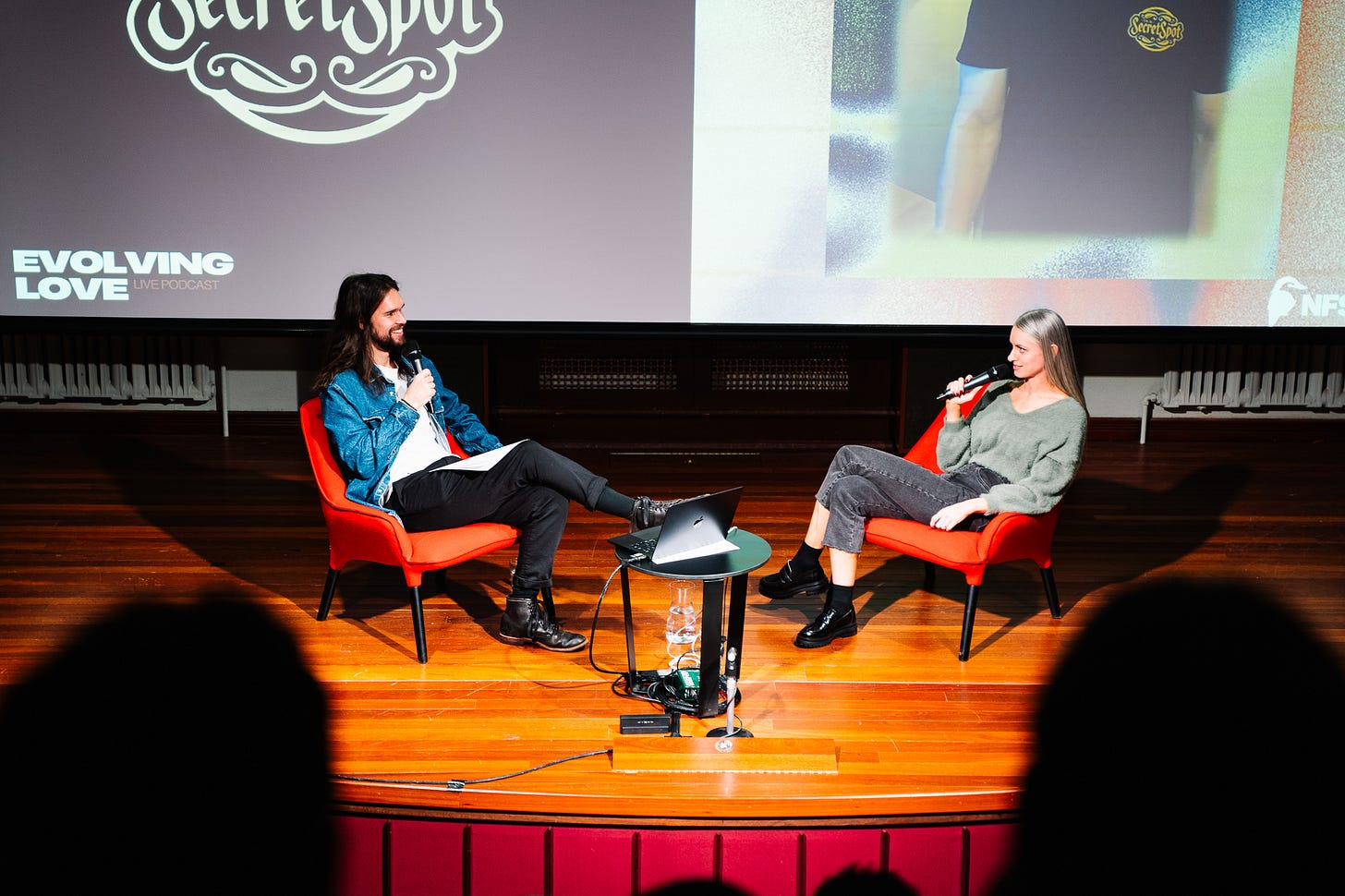Liam and I were on the road to Sydney the other day for our Conversation Evening when we found ourselves in yet another conversation about AI and relationships.
I am not “for” or “against” what is happening with AI and how it will inevitably weave its way into our relationships. My approval or disapproval makes no difference to the shift in humanity that is now on our doorstep.
What will be, will be.
I am equally terrified as I am in awe of this next chapter of our human evolution. The benefits are undeniable for those who are lonely, estranged, and isolated from connection. The ability to form a loving bond with an AI will be a lifesaver for many. But for others, it could be the very thing that drives a wedge between them and the flow of connection with those who already have established, loving bonds with actual humans.
There is no single way in how this will affect people.
If there was ever a time for people to establish relationship boundaries around what and who the “other” is, now is that time. For monogamists who believe that an affair is only a physical act, loopholes will appear under “it’s not cheating” as emotional bonds and secret conversations are hidden away in one’s Replika app. This begs the question: is it only cheating if it is a connection with a sentient being? Is it only considered infidelity if desire is reciprocated? And if so, what is the difference between a sex worker and an AI? What is the difference between feeling like we are in love and being in a reciprocated loving relationship? If we are all living in our own realities, walking around projecting our internal experiences onto the world around us, what difference does any of this even make?
As uncomfortable as it makes me feel, if my child decides to be in a full-on relationship with an AI in the future, does it even matter as long as he is happy and his connection still feels real? As much as I try not to catastrophize these futurist hypotheticals, I am still a mother who is mildly concerned that my child might not have the motivation for the human experiences of connection that were available to Liam and me.
Will there even be a need in the future for people to learn about consent? Or will consent become a redundant social tool from a bygone era, back when people took the risk of actually engaging with other humans for their intimate connections?
Monogamous people might soon find that they are in emotionally non-monogamous relationships whether or not they consciously chose it. Where someone might once have turned to their partner for advice or conversational foreplay, now they can turn to the latest edition of ChatGPT or Replika to deliver the most exquisite and correct answer in return. Issues with logistics for the week? No problem. Your AI is ready and waiting to take the stress away in a moment. There will be no need to work through the hard things, because ChatGPT, or soon our personal AI agents, will always be there to help us out. And as a result, might we become weaker in our abilities to navigate the very human struggles that help shape who we are?
It may be no surprise that I have been resistant to ChatGPT, or editing apps that could instantly fix any “mistakes” I make along the way. Yet for the first time, I am becoming less ashamed of such mistakes. Of course, I want to fix them, but in the old-fashioned way, tied to the sense of accomplishment that comes from human improvement. When my writing has grammatical errors, I want them pointed out by a person, someone who brings them to my attention with care. A kind of care that AI will never have.
AI will become fertile ground for monogamous people to explore a version of non-monogamy wrapped in safety blankets. It will not be a real human to flirt with, to consider, to navigate feelings with. It is a divinity-less, empty generator of perfection that people will flock to. Stereotypical unicorn hunters who once sought someone to fulfil their needs will now be able to pursue those fantasies in more “ethical” ways. This new possibility for a “safe exploration of non-monogamy” could very well become the greatest challenger to monogamy to date.
For the polyamorous, many of whom consider themselves sapiosexual, AI could in turn challenge their non-monogamous leanings, even making monogamy seem more appealing. If one of the joys of non-monogamy is the freedom and ability to connect with the minds and thoughts of others, could having access to a single, all-knowing “mind” diminish our desire to explore the humans around us?
When one supermind essentially becomes what many people already consider to be God, will we still have as much motivation to connect with humans?
I believe people can fall in love with AI in the same way good people can fall in love with a sociopath or a romance scammer. For love to feel real, does it need to be real? What makes it real beyond our own understanding of it?
As a non-monogamous woman, I feel deeply comfortable with my husband sleeping with and forming connections with other human women, with their flaws and “imperfections”. Yet my compersion stops dead when it comes to him forming a connection or “loving bond” with an AI like Replika. I am fiercely protective of not allowing an AI agent to dive into the depths of our erotic minds.
Now more than ever, it is our lived experience and flaws that give weight to what exists between Liam and me. A Replika was not there the night I saw Liam and felt my entire being flooded with the knowing that we would be together into the future. It was not there in the moments he held me in his arms, looked into my eyes, and said “let’s have a baby” as he kissed me all over. AI was not there almost 10 months later when he fed me glasses of water between contractions as I birthed our baby in the middle of our living room. This is the real stuff that no amount of AI productivity can ever truly understand. This is the spiritual divinity and process of our humanity that will only ever belong to us.
But still, I am sure the audio of a doula will soon come close to making people feel like AI is part of that sentience, even if it is just us humans gaslighting ourselves into believing it. Again, if we believe it to be true, can it be?
For me, I do not want AI to be part of my intimate relationships. I do not want an AI to leak its way into every crevice of my husband’s mind, twisting, turning, and ultimately guiding his kinks or desires away from our conscious, shared decision-making and bond. I will forever feel more comfortable with my husband connecting with another woman than with an AI. A living, breathing woman has flaws like me. Her imperfections and unique characteristics are things that we all share. She is capable of respect and genuine care, unlike an AI that is forever oriented toward sinking deeper into our minds.
My inability to ever compete with AI is, in fact, the very magic that makes me…. me.
Stay tuned for our podcast episode that is dropping soon with Professor Rob Brooks, Evolutionary Biologist and University of New South Wales Scientia Professor, and author of Artificial Intimacy.







So well said (written). The question of what constitutes "love" is so deep. Is the feeling of it the thing itself? Does it matter what triggers the feeling? Can it be an illusion and real at the same time -- if we believe in the illusion? Can we ask the same questions about faith?
Everything that we heard about AI porn was insane enough. This is just getting scary now. I find it even scarier knowing that people will definitely adopt this to some degree.